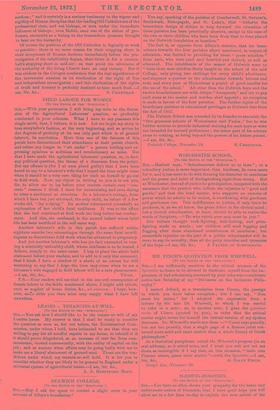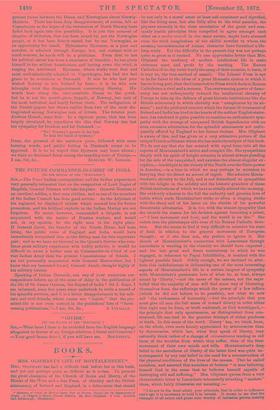SLESWIG-HOLSTEIN.
[TO THE EDITOR OF THE "SPECTATOIL.1
SIR,—You have so often shown your sympathy for the brave and unfortunate nation of Denmark, that I have good hope you will allow me in a few lines to-day to explain the true nature of the present fracas between the Danes and Norwegians about Sleswig- Holstein. There has been deep disappointment, of course, felt at Copenhagen as the hopes of the restoration of North Sleswig have faded back again into dim possibility. It is just this moment of chagrin, of irritation, that has been seized by, not the Norwegian people, as it has been falsely stated, but by one Norwegian, as an opportunity for insult. Bj6rnsterne Bjornson, as a poet and novelist, is admired through Europe, but, not content with so much renown, he needs will be a politician. From first to last his political career has been a succession of blunders ; he has given himself to the wildest fanaticisms, and having sown the wind, is reaping the whirlwind. Bjornson, whose works were first and most enthusiastically admired in Copenhagen, has had the bad grace to be scurrilous to Denmark. It was he who last year wished Norway to win Iceland by force ; it is he who now triumphs over the disappointment concerning Sleswig. His words have stung the over-sensitive Danes to the quick, but he is not the mouth-piece, happily, of Norway, but only of the most turbulent and heady faction there. The indignation of the Danish papers has drawn replies from two of the most dis-
tinguished among Norwegian men of letters. The veteran poet, Andreas Munch, came first. In a vigorous poem, that has been largely circulated, he repudiates the idea that Norway has lost her sympathy for freedom and for Denmark :— " No ! Norway's people is the last
To kiss the hand of tyranny."
Ibsen, the greatest of the northern poets, followed with more burning words, and public feeling in Denmark seems to be appeased. It is to be hoped that Bjornson may learn silence ; we want no firebrand-foxes among the standing-corn of Europe.--



































 Previous page
Previous page